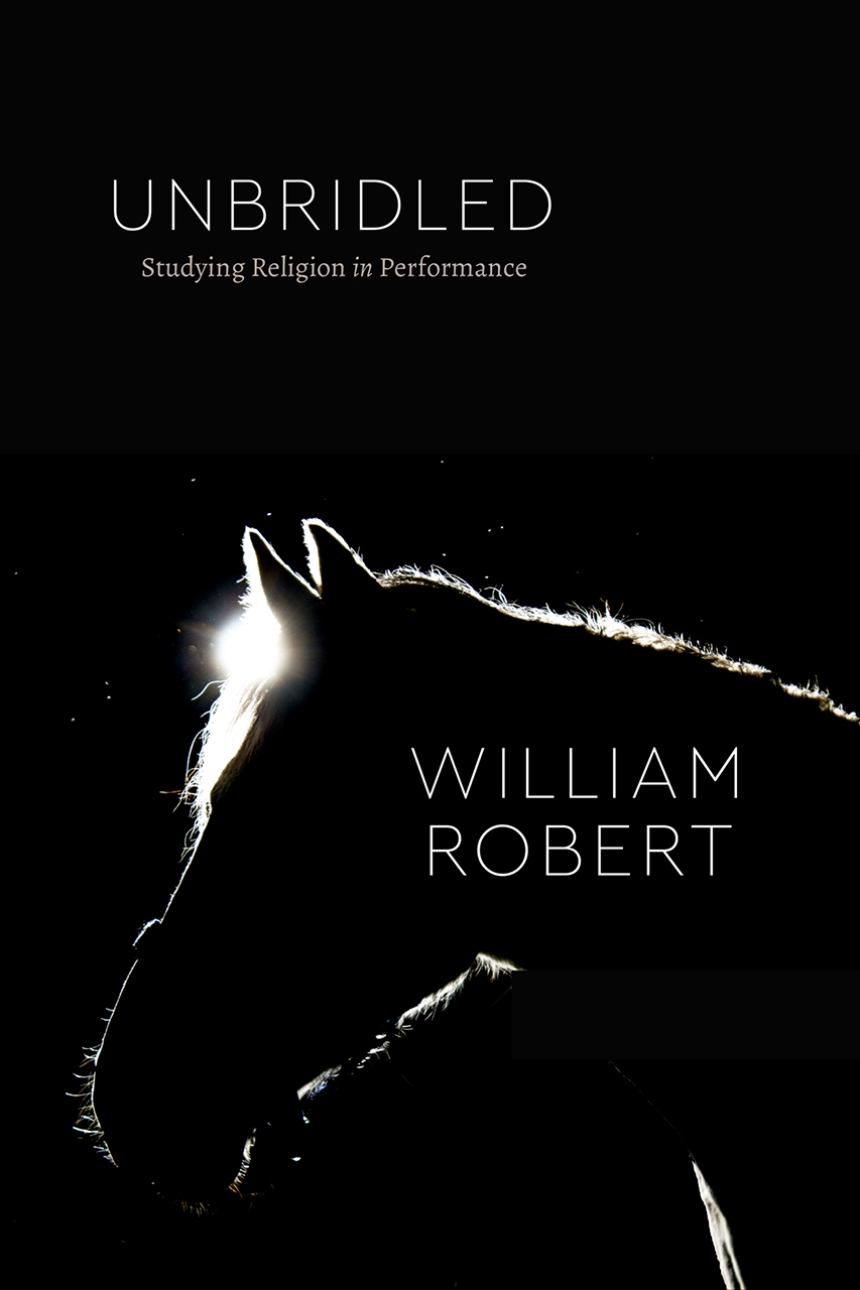Unbridled
Studying Religion in Performance
A study of religion through the lens of Peter Shaffer’s play Equus.
In Unbridled, William Robert uses Equus, Peter Shaffer’s enigmatic play about a boy passionately devoted to horses, to think differently about religion. For several years, Robert has used Equus to introduce students to the study of religion, provoking them to conceive of religion in unfamiliar, even uncomfortable ways. In Unbridled, he is inviting readers to do the same.
A play like Equus tangles together text, performance, practice, embodiment, and reception. Studying a play involves us in playing different roles, as ourselves and others, and those roles, as well as the imaginative work they require, are critical to the study of religion. By approaching Equus with the reader, turning the play around and upside-down, Unbridled transforms standard approaches to the study of religion, engaging with themes including ritual, sacrifice, worship, power, desire, violence, and sexuality, as well as thinkers including Judith Butler, Sigmund Freud, Karl Marx, Friedrich Nietzsche, and Jonathan Z. Smith. As Unbridled shows, the way themes and theories play out in Equus challenges us to reimagine the study of religion through open questions, contrasting perspectives, and alternative modes of interpretation and appreciation.
In Unbridled, William Robert uses Equus, Peter Shaffer’s enigmatic play about a boy passionately devoted to horses, to think differently about religion. For several years, Robert has used Equus to introduce students to the study of religion, provoking them to conceive of religion in unfamiliar, even uncomfortable ways. In Unbridled, he is inviting readers to do the same.
A play like Equus tangles together text, performance, practice, embodiment, and reception. Studying a play involves us in playing different roles, as ourselves and others, and those roles, as well as the imaginative work they require, are critical to the study of religion. By approaching Equus with the reader, turning the play around and upside-down, Unbridled transforms standard approaches to the study of religion, engaging with themes including ritual, sacrifice, worship, power, desire, violence, and sexuality, as well as thinkers including Judith Butler, Sigmund Freud, Karl Marx, Friedrich Nietzsche, and Jonathan Z. Smith. As Unbridled shows, the way themes and theories play out in Equus challenges us to reimagine the study of religion through open questions, contrasting perspectives, and alternative modes of interpretation and appreciation.
144 pages | 6 x 9 | © 2022
Class 200: New Studies in Religion
Literature and Literary Criticism: Dramatic Works, General Criticism and Critical Theory
Religion: Christianity, Philosophy of Religion, Theology, and Ethics, Religion and Literature
Reviews
Table of Contents
Playbill
Program Notes
Cast
Prologue
Act 1
1.1 Mise-en-scène
1.2 Imagination
1.3 Literature
1.4 Performance
1.5 Case
1.6 Terms
1.7 Problems
1.8 Question
Act 2
2.1 Staging
2.2 Performance-Text
2.3 Inter-
2.4 Mask
2.5 Play
2.6 Acting
2.7 Make-Believe
2.8 Play-in-Play
Act 3
3.1 Casting
3.2 Relations
3.3 Image
3.4 Human-Horse-Divinity
3.5 Devotion
3.6 Sexuality
3.7 Queer
3.8 Nude
Act 4
4.1 Directing
4.2 Passion
4.3 Pain
4.4 Normal
4.5 Tragedy
4.6 Sacrifice
4.7 Ending
4.8 Value
Epilogue
Encore
Credits
Notes
References
Index
Program Notes
Cast
Prologue
Act 1
1.1 Mise-en-scène
1.2 Imagination
1.3 Literature
1.4 Performance
1.5 Case
1.6 Terms
1.7 Problems
1.8 Question
Act 2
2.1 Staging
2.2 Performance-Text
2.3 Inter-
2.4 Mask
2.5 Play
2.6 Acting
2.7 Make-Believe
2.8 Play-in-Play
Act 3
3.1 Casting
3.2 Relations
3.3 Image
3.4 Human-Horse-Divinity
3.5 Devotion
3.6 Sexuality
3.7 Queer
3.8 Nude
Act 4
4.1 Directing
4.2 Passion
4.3 Pain
4.4 Normal
4.5 Tragedy
4.6 Sacrifice
4.7 Ending
4.8 Value
Epilogue
Encore
Credits
Notes
References
Index
